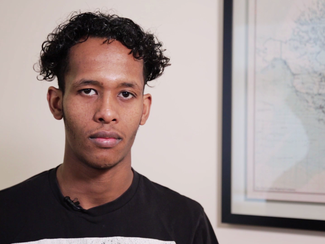Faisal was living in Saudi Arabia with his family when he found himself on the wrong side of the law and was sent back to Eritrea. No more than six months after his arrival, and at the age of 17, he decided to take the journey to Europe.
“Since my uncle had gotten to Libya without any problems I thought that that I could make it as well,” he recalls. “Nobody told me about the challenges in Libya.”
In Sudan, things seemed tough for Faisal. He depended on his mother, who was still in Saudi Arabia, for financial support, and felt lonely without any friends or family members. In Sudan, Faisal felt generally unwelcome.
“When I heard about Libya, I didn’t think it would be any tougher than Sudan,” says Faisal. “I was 17 and naive. I couldn’t imagine how tough life could be.”
Like many others, Faisal got in touch with smugglers in Omdurman, a market north of the Sudanese capital Khartoum. Omdurman is a known market place for not only camels and other commodities, but also for human smugglers facilitating the travel of refugees and migrants to Europe.
There, Faisal was exposed to the complex and often deceitful and entangled web between smugglers and authorities. Due to regular police patrol, Faisal, together with approximately 120 other people, was constantly moved from house to house. On one occasion, people dressed as Sudanese soldiers broke into the house, where Faisal and other refugees and migrants were staying, and demanded they hand over all their money and valuables, threatening to throw them in jail if they didn’t.
The journey across the Sahara to the northern city of Ajdabiya was riddled with all sorts of difficulties, and the traffickers beat the men and women indiscriminately at the slightest provocation. In order to pass through road blocks and controls, the smugglers covered the vehicles in tent-like fabric, leaving the refugees and migrants struggling against near suffocation.
Faisal’s medical condition left him prone to constant asthma attacks which were further aggravated by the heat and lack of sufficient fresh air, especially when they were crammed and covered in pick-up trucks.
In Ajdabiya, in addition to being on the receiving end of the traffickers’ constant anger spasms, Faisal and the other refugees and migrants were plagued by the fear of getting caught by authorities.
During one instance, police broke into the house where the refugees were being kept.
The police entered our place thinking that we were criminals,” Faisal recalls. “I was really scared and I was shaking because the gun was pointed at me… They took us out and they were firing so that we would walk quickly. They were firing at the floor.”
The authorities let them go once they determined they were not criminals. However, their freedom was short lived. Shortly after, two of their traffickers had a falling out and one of them alerted the police of their location and intentions to get to Europe. Faisal, and a few other refugees who hadn’t managed to escape, were thrown into prison.

